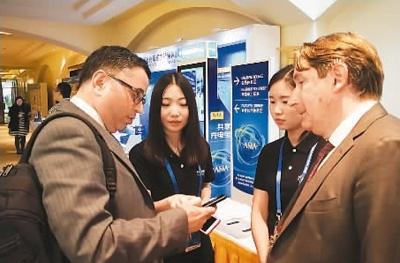Future prospects of artificial intelligence translators

Are you most afraid of outbound travel? In the face of Tokyo's Japanese menu, I wandered around the streets of Paris and wanted to ask for directions, but I couldn't open my mouth. I went to South Korea to buy shopping because of language barriers... The embarrassment caused by this series of language barriers made the expected departures change. Not so happy. In recent years, with the popularity of free travel, people's demand for instant translation has become increasingly strong, and artificial intelligence translators have become an essential "artifact" for outbound travel. Technology Internet giants have also stepped into the field of intelligent translation. The market is so hot, what is the prospect of artificial intelligence translators? Will it replace human translation?
The market is rising rapidly
According to the "2017 China Outbound Tourism Big Data Report", in 2017, Chinese citizens' outbound travel exceeded 130 million, with a cost of 115.29 billion US dollars. China has become the largest in Thailand, Japan, South Korea, Vietnam, Russia and other countries. Inbound tourist source. However, some research shows that language barriers have always been the biggest pain point for outbound travellers.
Xiaohan is a "post-90s" who loves to travel. Most of the domestic and large-scale attractions have been played all over, but the passport is still "white." It is not because of anything else, that is, the language is too close, so I dare not go out to play. once.
Not long ago, Xiao Han finally dared to travel alone. She completed the 7-day free trip in Japan with the help of the newly purchased artificial intelligence translator. "I used to talk about going abroad to play back. I am worried that I will neither say nor understand too much. Now I have a machine to help translate, and I am practical. too much."
During the trip to Japan, Xiaohan not only easily made road signs, restaurant menus, supermarket shopping, etc., but also met some foreign friends on the road. Xiao Han said, "Because of the translation of the machine, in addition to daily conversations, you can also talk about some local customs, which allows me to communicate more deeply with the locals and become friends with people with similar interests."
The popularity of outbound travel, coupled with the continuous upgrading of artificial intelligence translation technology, has gradually promoted the rise of the domestic intelligent translation machine market. According to various data, the annual outbound travel of China in 2016-2018 is more than 100 billion US dollars, of which only the sales market of translation machines is as high as 100 billion yuan per year.
Development challenges
The artificial intelligence translation machine market is promising, but it also faces multiple challenges. At present, the price of most products in the domestic mainstream artificial intelligence translation machine is generally high, and some even exceed the high-end mobile phones. The author searched for "smart translators" on the platforms of Jingdong and Tmall Mall. It was found that these products are all pocket-sized, similar in appearance, can be translated into multiple languages, and can be used offline. Their prices are mostly concentrated at 600. Yuan - 3000 yuan.
The price of “excers” for outbound travel is high, and most tourists travel abroad two or three times a year. This demand is far from enough to make people spend hundreds or even thousands of dollars to buy. Therefore, the low frequency of offline use has become another major challenge for artificial intelligence translators. Some travel agents said that for travelers who only travel once or twice a year, they may prefer to rent a translation machine, and the online travel platform will launch a translation machine rental service at a price of several tens of yuan. The cheapest is only 17 yuan.
Expensive? Use frequency is low? Even so, there may still be “local buyers” willing to pay for “artifacts”. However, the inaccurate vocabulary translation and the blunt speech synthesis are the biggest bottlenecks in the future development of artificial intelligence translators. Some people have personally tested some intelligent translation machines on the market and found that the level of machine turning is not satisfactory. For example, the machine translates "blond hair" into a "Greek gift", such as a blunt voice synthesis for users. In the formal occasions, it is extremely incomparable. These problems are in urgent need of intelligent translators for further manual optimization or machine learning.
Achieve mismatch competition
In the age of intelligence, even artists are worried about whether they will be replaced by artificial intelligence, let alone manual translation. In fact, in most foreign-related scenarios, there is no need for very professional and accurate simultaneous interpretation, such as daily communication; and the limited supply of simultaneous simultaneous interpretation does not meet the current huge market demand.
So, can artificial intelligence translation completely replace human translation? The answer is of course no. The emergence of artificial intelligence is not to replace people, but to better help humans get the job done. Machine translation not only does not grab the "rice bowl" of human translation, but also effectively supplements it. Wu Gang, deputy dean of the Shanghai International Studies University, believes that the machine can replace the part of the translation with relatively simple skills and less human intelligence, so that people can free up more energy to engage in more creative activities.
In the future, human translation and machine translation will gradually become clear in the target market. “Machine translation and human translation will occupy different niches in the market and achieve dislocation competition.” Chen Qi, an associate professor of the Department of Language and Literature at the School of English, Shanghai International Studies University, said that in the low-end translation market, machine translation will dominate, and human translation will It is mainly for high-end markets that require strict translation accuracy, such as literature, legal documents, medical materials and other professional content. (Pang Wei-Article from People's Daily Overseas Edition)








